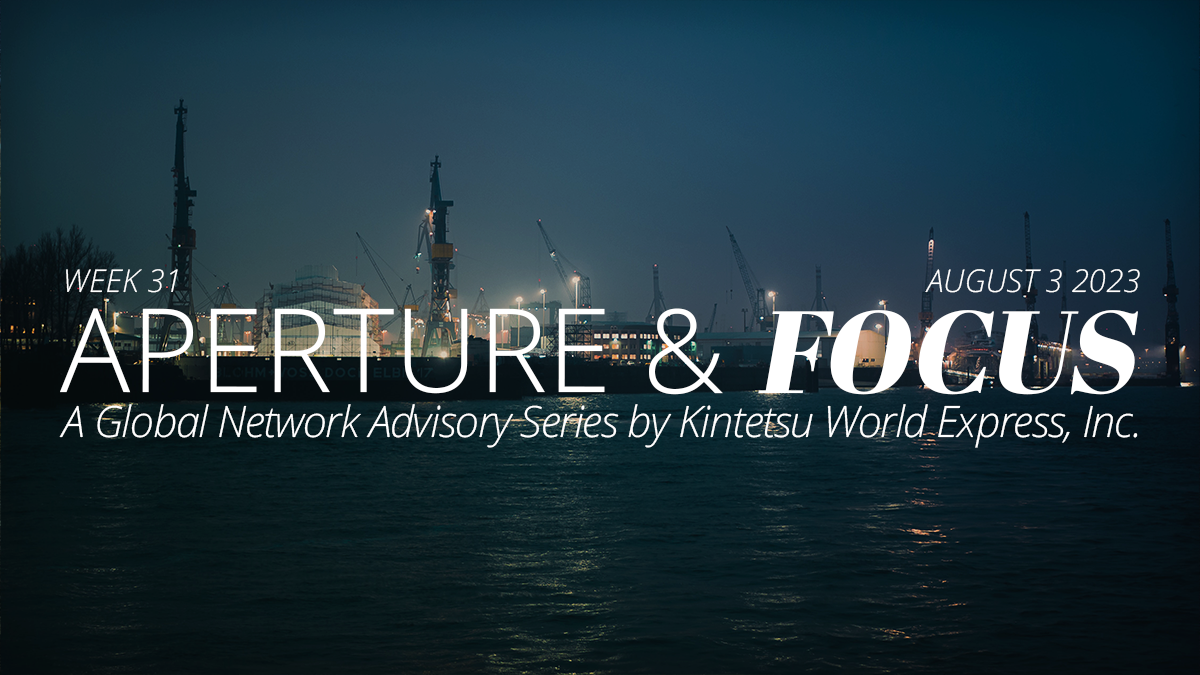Quote
Aperture & Focus 2023: Week 31

Global Aperture
The climate outlook continues to cause concerns for ocean shipping as a new study pointed to the possible eminent collapse of a crucial ocean current and drought continued to affect transit of key waterways. European commerce has faced significant revenue loss due to low water levels in the Rhine River and passage of the containership Ever Max through the Panama Canal's Neopanamax Locks on highlighted the challenges faced by the canal and the container shipping industry due to the decline in traffic and draft restrictions. Despite being one of the largest containerships, the Ever Max had to reduce its load to meet the canal's 44-foot maximum permitted draft and offloaded 1,400 TEU in Balboa for transshipment across the isthmus via train before completing the transit.
Regional Focus
Americas
Canada: On August 1, a new labor contract was provisionally agreed upon by the International Longshore and Warehouse Canada Union, representing dockworkers, and the British Columbia Maritime Employers Association (BCMEA), representing port employers on Canada's West Coast, avoiding an immediate strike. However, the agreement's approval depends on a ratification vote by workers who had rejected the previous agreement, leading to a two-week strike disrupting over $4.6 billion in trade at the ports of Vancouver and Prince Rupert. The vote will take place on August 3 and 4.
USA: A new bipartisan bill introduced in the U.S. House of Representatives would provide tax incentives to private marine terminal operators, allowing them to use a tax-deferred account to purchase American-made cargo handling equipment. The legislation is designed to support the modernization of infrastructure at America's ports and harbors, while also helping to lower the cost for terminal operators to transition to low-emission cargo handling equipment.
Asia-Pacific
China: Torrential rains, flooding, and approaching typhoons in China continue to disrupt supply chains, impacting cargo handling, customs clearance, and overall network operations. Several key ports, including Ningbo, are preparing for the impact of Typhoon Kanu, leading to schedule delays and potential adjustments in shipping routes.
India: India’s ports remain clogged with cargo and containers full of rice after the government imposed export restrictions that began on July 20th without notice. The ban on non-basmati white rice exports left around 200,000 tonnes of the grain stuck at ports. As it had been issued after most cargoes had obtained customs clearance, rice was stranded at the ports, and according to the International Monetary Fund's chief economist, the move could potentially exacerbate global food price inflation.
Europe, Middle East & Africa
Germany: The Rhine River experienced some improvement in water levels due to heavy rainfall in its upstream regions during the month of July, providing some relief to shippers and barge operators. However, the northern regions around Cologne and Duisburg are still experiencing shallow water levels, affecting normal shipping operations, and companies are adapting by chartering low-water barges and implementing surcharges depending on water levels.
Netherlands: After burning for nearly a week, a fire on the car-carrier Fremantle Highway was extinguished, and authorities confirmed there were no hull breaches below the waterline, reducing the immediate risk of sinking. The fire, which resulted in one death and 22 injuries, highlighted the link between fires aboard seafaring vessels and the lithium-ion batteries inside electric vehicles just as calls for increased oversight become more common.